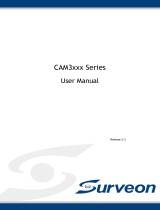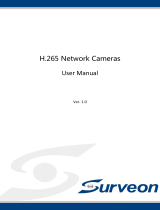
6
Motion Detection ................................................................... 73
Tampering Detection .............................................................. 75
DI & DO............................................................................... 76
Event Settings....................................................................... 78
System..................................................................................... 84
MicroSD Card Management........................................................ 84
System Status ....................................................................... 85
System Log........................................................................... 86
Firmware Upgrade.................................................................. 87
Emergency Recovery Procedure.................................................. 88
Resetting to Factory Default Settings........................................... 88
Export/Import & Reboot .......................................................... 90
Chapter 5. Configuration through the IP Utility .......................................91
5.1. Overview..............................................................................93
5.2. Installing the IP Utility..............................................................93
5.3. IP Utility Basics ......................................................................95
Starting the IP Utility................................................................... 95
IP Utility Main Screen................................................................... 95
Exiting the IP Utility .................................................................... 95
5.4. Camera Actions ......................................................................96
Search..................................................................................... 96
Login....................................................................................... 96
Properties................................................................................. 97
Delete from Tool ........................................................................ 98
Select All.................................................................................. 99
Rebooting Camera....................................................................... 99
Set IP .....................................................................................100
Link to Camera Web Interface .......................................................101
Link to Camera.....................................................................101
Link to Camera User Manager ...................................................101
Clearing and Setting Status...........................................................102





















